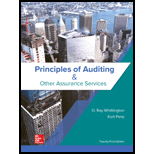
EBK PRINCIPLES OF AUDITING & OTHER ASSU
21st Edition
ISBN: 9781260299434
Author: WHITTINGTON
Publisher: YUZU
expand_more
expand_more
format_list_bulleted
Question
Chapter 7, Problem 35KOQ
To determine
Identify the appropriate answer related to the documenting of the understanding of the internal control.
Expert Solution & Answer
Want to see the full answer?
Check out a sample textbook solution
Students have asked these similar questions
Answer ?? financial accounting question
Get correct answer this financial accounting question
Financial accounting
Chapter 7 Solutions
EBK PRINCIPLES OF AUDITING & OTHER ASSU
Ch. 7 - Prob. 1RQCh. 7 - Prob. 2RQCh. 7 - Prob. 3RQCh. 7 - Prob. 4RQCh. 7 - Prob. 5RQCh. 7 - Prob. 6RQCh. 7 - Prob. 7RQCh. 7 - Identify the four types of control activities and...Ch. 7 - One basic concept of internal control is that no...Ch. 7 - Prob. 10RQ
Ch. 7 - Prob. 11RQCh. 7 - Prob. 12RQCh. 7 - Prob. 13RQCh. 7 - Prob. 14RQCh. 7 - Prob. 15RQCh. 7 - Prob. 16RQCh. 7 - Prob. 17RQCh. 7 - Prob. 18RQCh. 7 - Prob. 19RQCh. 7 - Prob. 20RQCh. 7 - Prob. 21RQCh. 7 - Prob. 22RQCh. 7 - Prob. 23RQCh. 7 - Management is responsible for designing and...Ch. 7 - Prob. 25QRACh. 7 - Prob. 26QRACh. 7 - Prob. 27QRACh. 7 - Prob. 28QRACh. 7 - Prob. 29QRACh. 7 - Prob. 30QRACh. 7 - Prob. 31QRACh. 7 - During your first audit of a medium-size...Ch. 7 - Prob. 33QRACh. 7 - Prob. 34QRACh. 7 - Which of the following would be least likely to be...Ch. 7 - Prob. 35BOQCh. 7 - Prob. 35COQCh. 7 - Prob. 35DOQCh. 7 - Prob. 35EOQCh. 7 - Prob. 35FOQCh. 7 - Prob. 35GOQCh. 7 - Prob. 35HOQCh. 7 - Which of the following is not an advantage of...Ch. 7 - Prob. 35JOQCh. 7 - Prob. 35KOQCh. 7 - Prob. 35LOQCh. 7 - Prob. 36OQCh. 7 - Listed below are controls that have been developed...Ch. 7 - Prob. 38OQCh. 7 - For each term in the first column, find the...Ch. 7 - Prob. 40AOQCh. 7 - Prob. 40BOQCh. 7 - Prob. 40COQCh. 7 - Prob. 40DOQCh. 7 - Prob. 40EOQCh. 7 - Prob. 41PCh. 7 - Prob. 42PCh. 7 - Prob. 43PCh. 7 - Prob. 44PCh. 7 - Prob. 45ITC
Knowledge Booster
Similar questions
arrow_back_ios
SEE MORE QUESTIONS
arrow_forward_ios
Recommended textbooks for you
 Auditing: A Risk Based-Approach (MindTap Course L...AccountingISBN:9781337619455Author:Karla M Johnstone, Audrey A. Gramling, Larry E. RittenbergPublisher:Cengage LearningBusiness/Professional Ethics Directors/Executives...AccountingISBN:9781337485913Author:BROOKSPublisher:Cengage
Auditing: A Risk Based-Approach (MindTap Course L...AccountingISBN:9781337619455Author:Karla M Johnstone, Audrey A. Gramling, Larry E. RittenbergPublisher:Cengage LearningBusiness/Professional Ethics Directors/Executives...AccountingISBN:9781337485913Author:BROOKSPublisher:Cengage


Auditing: A Risk Based-Approach (MindTap Course L...
Accounting
ISBN:9781337619455
Author:Karla M Johnstone, Audrey A. Gramling, Larry E. Rittenberg
Publisher:Cengage Learning

Business/Professional Ethics Directors/Executives...
Accounting
ISBN:9781337485913
Author:BROOKS
Publisher:Cengage